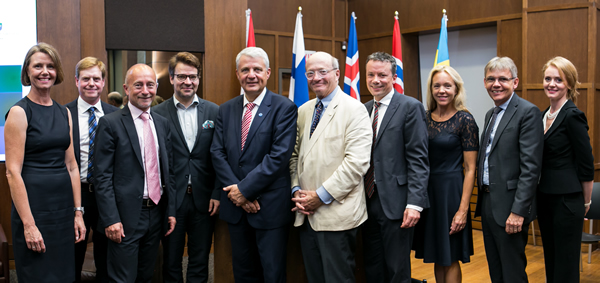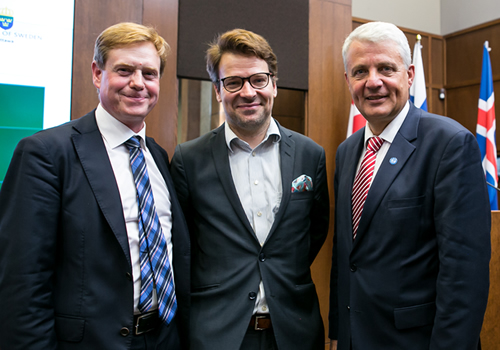In these times of globalization, many democracies around the world face the same social and political issues. From immigration to climate change, Canada can learn valuable lessons from other nations’ solutions to global challenges. This is why, with support from the Nordic Council of Ministers (NCM), the University of Toronto has launched a Nordic Studies initiative at the Munk School of Global Affairs.

The pilot initiative, which will be housed at the Munk School’s Centre for European, Russian, and Eurasian Studies (CERES), offers a number of undergraduate and graduate courses examining the politics, society, and culture of the Nordic countries – Denmark, Finland, Iceland, Norway and Sweden. It will also feature public events covering topics from trade to film and will establish research networks with academic institutions in the Nordic countries, allowing for student and scholarly exchange. The NCM’s donation marks the first time that the council, an official inter-governmental body for Nordic political and cultural co-operation, has funded a program of this kind in North America.
The new Nordic Studies initiative was launched on September 19 at an event featuring a robust examination of innovative solutions to our shared global challenges by diplomatic leaders, scholars, U of T students and representatives from across the member countries and states of the NCM.
“Canada and the Nordic countries share more than latitude and long winters,” said Randall Hansen, interim director of the Munk School. “We have a shared commitment to liberal institutions, open markets, and diplomatic solutions to global challenges. Canada has much to learn from the Nordic countries. They, quite simply, combine economic prosperity and social justice to an unparalleled degree. This is the right time for Canadians to train our eye more closely on the Nordic countries – on the politics, public policies, institutions, and economic infrastructure that together constitute the Nordic model. We are deeply honoured to be selected by the Nordic Council of Ministers as the home of this exciting new initiative.”

“We believe in exchanging knowledge on and between our respective regions”, says Dagfinn Høybråten, Secretary General of the Nordic Council of Ministers. “We believe that Canada and the Nordic region – on the one hand – have so much in common in terms of values and – on the other hand – have different strengths and can learn from each other. Within the field of education and research, I believe that it could be interesting for Canadians to learn about the Nordic model and why the Nordic countries are placed in top 10 on important rankings when it comes to many of the competencies needed in the future. At the same time, universities in North America, and in Canada, rank higher than the Nordic countries and we have something to learn in that respect. That is why the match between the Nordics and the University of Toronto is good. We basically believe in the strength of science, knowledge and education. And we believe in strategic partnerships for the prosperity of our societies. And we hope to see this fulfilled with the Nordic Studies initiative at the Munk School of Global Affairs”.
“Over the past 25 years, the Nordic Council of Ministers has been engaged in macro-regional cooperation in the Arctic, in the Barents Sea Region, in European Union matters, and in the Baltic Sea Region,” said Nauja Bianco, Program Manager at the Nordic Council of Ministers. “About 10 years ago, the Nordic Council of Ministers decided to also cooperate with neighbours to the West not because of geographical proximity but because of joint interest and value on thematic areas. We have a program called Cooperation with Neighbors to the West and cooperating in the field of education and research is exactly one of our goals. We have high hopes for the Nordic Studies initiative at the U of T.”
Iason Rodopulos, a fourth-year U of T student, is among the first to enrol in the course on Nordic politics and sees the Nordic Studies initiative as a way to improve his international perspective on social issues. “I’m interested in learning more about the Nordic model of economic growth. I’m also interested in analyzing the reasons behind the rise of populist parties in Europe. The initiative will be helpful for me because I want to focus on European politics in my graduate studies, but its focus on how international policy is relevant to Canada makes it a valuable offering for any student.”

